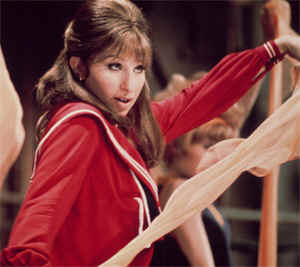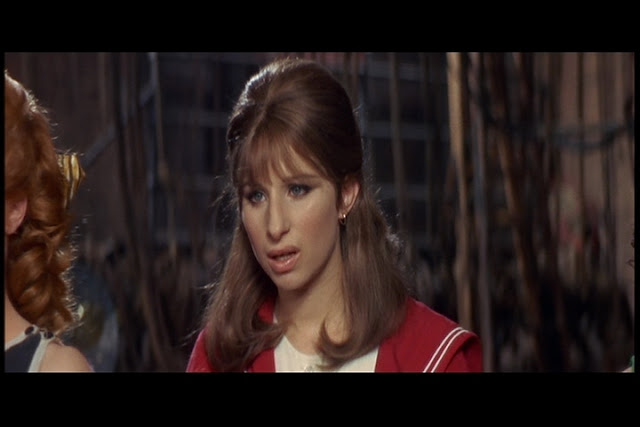This is a guest review by Jessica Freeman-Slade.
The 1968 movie is legendary, almost impossible to remake due to Streisand’s unforgettable turn (recreating her role from the 1964 stage musical), and with music by Jule Styne and lyrics by Bob Merrill. It’s based on the true story of 1920s entertainer Fanny Brice, one of the major attractions in the golden age of Florenz Ziegfeld’s Follies. Fanny knows she’s a star, but is constantly told that her unconventional looks will keep her off the stage (or as her neighbor puts it, “If a girl’s incidentals/are no bigger than two lentils/then to me it doesn’t spell success.”) But Fanny stands out, because she’s hilariously funny and has a golden voice, and so fame, like anyone who watches the movie, finds her irresistible. What the movie has at its core, is a message about female self-confidence, about self-reliance, about how the world reacts to strong women, and how, ultimately it’s all about chutzpah. Which Fanny (and Streisand) has in spades.
Streisand had only appeared in one Broadway show before then, a small but memorable part in I Can Get It for You Wholesale, and she was far from the only candidate to play Fanny. When Jule Styne consulted Steven Sondheim about the development of the show, Sondheim had major qualms about potentially casting a marquee star like Mary Martin. “I don’t want to do the life of Fanny Brice with Mary Martin. She’s not Jewish,” he said. “You need someone ethnic for the part.” And Streisand was ethnic, especially when put up against a bevy of chorus girls that looked like they’d stepped straight out of Beach Blanket Bingo. The other contenders before her included Anne Bancroft, Martin, and Carol Burnett, but Streisand took the ugly duckling premise and turned it on its head every time she sang. (Fanny’s first line to a skeptical producer says it all: “Suppose all you ever had for breakfast was onion rolls. Then one day, in walks… a bagel! You’d say, ‘Ugh, what’s that?’ Until you tried it! That’s my problem—I’m a bagel on a plate full of onion rolls.”) And she stood out among the other Broadway stars at the time, in the same way Fanny did in her day.
Yes, I know. You have to believe that this girl…
…is considered unattractive, uncastable, and undesirable.
The real Brice had big gummy features–a clown’s face. And though Streisand looks gorgeous in every shot, even in Fanny’s pre-fame days (check out those amazing nails), she doesn’t lose her undeniably ethnic look. She stands out, especially when surrounded by all the Aryan thin-nosed beauties of the Ziegfeld follies. And so the premise of Funny Girl, of almost every joke, rests on whether you believe that Fanny, despite her face, earns every drop of success because of her extraordinary talent. Each joke has the same structure: someone throws a derogatory comment Fanny’s way. Fanny volleys, with wit and acid and intelligence. The movie provides a model to every girl out there (no matter how attractive she is) about how to deal with a world that doubts you because of your appearance, because of your difference. When everyone’s a critic, especially in the entertainment industry, and you know you’re something special, they will have to accept you as you are, and fall in love with you for what you bring to the performance. Just watch Fanny’s first performance for a theater, and how she bends the audience to her will:
Then the joke changes—how could a guy as perfect and beautiful as Arnstein fall for a gummy-faced girl like Fanny? Because he knows what the rest of the world doesn’t—that she has a spark, she stands out, and that’s a sign she’s going to be a star. But the movie, as it traces Fanny’s rise to stardom, constantly returns to the presumably unassailable fact that she can’t hold Nick, or anything, in place simply by being female and beautiful. And so the movie becomes a commentary on what an unconventional woman does to keep herself successful in a world that doesn’t immediately recognize her talent.
Fanny, blessedly, has little time for people who insist she behave conventionally. Even when she lands the dream job, as a featured player among the glittering chorines of Ziegfeld’s follies, she balks at behaving like any other starlet. When Ziegfeld (Walter Pidgeon) puts her in the star spot in the closing number, she says, “I can’t Fanny: I can’t sing words like: “I am the beautiful reflection of my love’s affection.” I mean… Well, it’s embarrassing… If I come out opening night…telling the audience how beautiful I am, I’ll be back at [my first job] before the curtain comes down.” When he refuses to do so, Fanny concedes, but finds her own special twist for the number:
Even when Fanny hooks Nick, and even after she gets to sing a ditty about how great it is to be “Sadie, Sadie,” married lady, the story continues to treat Fanny as a liability. When Nick finally starts showing his shortcomings as a card shark, he is too insecure and prideful to ask Fanny to bail him out. He is thrown into prison, and Fanny gets the news just as she’s heading out of the theater for the night. “You still love him, Miss Brice?” the reporters shout. “The name’s Arnstein,” she replies defiantly. This is a woman who refuses to let her critics define her—even if it means putting the joke on her.
What ultimately carries Fanny, and Funny Girl, as one of the greatest musical comedies ever (and makes Fanny one of the best characters, male or female, ever written for Broadway) is that her weapon is always her strength, her self-reliance, that aforementioned chutzpah. Fanny truly believes that she can do or accomplish anything, including saving her own doomed marriage, if someone just gives her the chance. When she and Nick decide to separate after his release from prison, she is utterly heartbroken. But even in that moment, she pulls herself up and delivers a superb performance, looking more beautiful and elegant than ever. And that’s where the message of Funny Girl really sings out: NOTHING is as radiant as self-confidence.
———-
Jessica Freeman-Slade is a writer who has written reviews for The Rumpus, The Millions, The TK Review, The Los Angeles Review of Books, and Specter Magazine, among others. She works at Random House as a cookbook editor, and lives in Morningside Heights.







One of my favourite Babs movies. Thanks for the walk down memory lane.
I loved this movie for that and the quote where she talks about how beautiful girls will go out of style. It’s so true! Because the standard of beauty changes a lot and the Flavor of the Month will change (look at Mad Men where Betty, a “Grace Kelly type” is replaced with a “Audrey Hepburn type”)